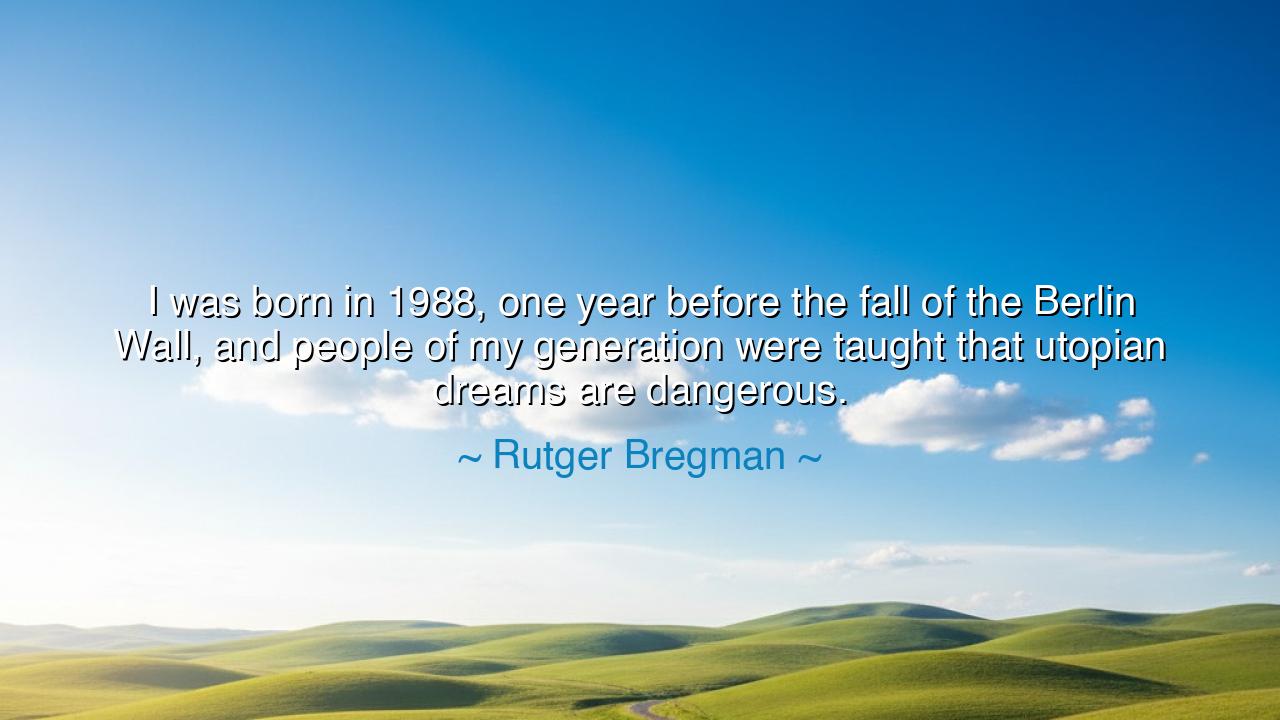
I was born in 1988, one year before the fall of the Berlin Wall
I was born in 1988, one year before the fall of the Berlin Wall, and people of my generation were taught that utopian dreams are dangerous.






In the words of Rutger Bregman, "I was born in 1988, one year before the fall of the Berlin Wall, and people of my generation were taught that utopian dreams are dangerous," we find a profound reflection on the shifting perceptions of idealism and ambition over time. For Bregman’s generation, growing up on the precipice of the Cold War’s end, there was a sense that utopian visions, those dreams of a perfect society, were no longer achievable or even desirable. The world of their youth was shaped by the belief that dreams of perfection—whether in the form of communism, socialism, or any grand political vision—led to failure, disillusionment, and sometimes even suffering. The fall of the Berlin Wall, an event that marked the end of an era of ideological conflict, left an indelible mark on the collective consciousness, teaching a generation that idealism could, at best, be naïve, and at worst, dangerous.
This notion of utopian dreams being dangerous is not new. The ancients often warned of the dangers of idealism. In Plato's Republic, the philosopher offers a vision of the perfect state, where justice reigns supreme, but he also explores the inherent flaws of attempting to create such an ideal world. Plato was well aware that idealism, when pushed to extremes, could lead to the corruption of power. His vision was meant to inspire reflection, not blind adherence to an unattainable ideal. Similarly, Aristotle, though more pragmatic in his views, believed in the pursuit of virtue but recognized that societies could never be perfectly just, for they were subject to human imperfection. These ancient teachings speak to the danger of striving for something beyond our capabilities and the potential disillusionment that follows when utopian dreams collide with the imperfect reality of human nature.
Consider the story of Napoleon Bonaparte, whose ambition to reshape Europe into his vision of a unified empire was, at first, seen as a grand ideal. Napoleon’s vision of a new order was, in many ways, a modern attempt at a utopia, where equality, fraternity, and liberty would reign supreme. However, his dream—though born out of ideals of revolution—ultimately led to war, destruction, and the suffering of millions. Napoleon’s rise and fall echo Bregman’s insight that utopian visions, when unchecked and unattainable, can become dangerous, leading not to fulfillment but to discord and conflict. Like the dreams of many would-be reformers and revolutionaries, Napoleon's dream was ultimately crushed by the very forces it sought to overcome, revealing the fragility of human ideals when they are not rooted in the realities of human experience.
Bregman’s reflections on his generation’s skepticism towards utopian dreams also reflect the lessons learned from the 20th century’s greatest ideological battles—the Cold War, the rise and fall of communism, and the struggles of socialist movements around the world. The failures of these dreams, from the collapse of the Soviet Union to the tragic outcomes of totalitarian regimes, painted idealism in a harsh light. Bregman’s generation, born after the fall of the Berlin Wall, grew up witnessing the demise of one grand vision after another, leaving them to question the value of pursuing any utopian ideal. The world seemed to shift toward the practical, toward the realpolitik of the present, where the focus was on survival, adaptation, and pragmatic solutions to the pressing problems of the day.
Yet, Bregman’s reflections also contain a lesson of hope. If we look beyond the failures of past utopian dreams, we can find that their roots often sprouted from deep desires for justice, equality, and human flourishing. The danger of utopianism is not in the dreams themselves but in the rigidity with which they are pursued. A vision of a better world, while imperfect and difficult to achieve, can still serve as a guiding light—a compass that helps humanity strive toward greater good. It is in the pursuit of ideals that we find the courage to challenge the status quo, to seek improvement, and to transform society, even if we must accept that perfection is forever elusive.
The lesson from Bregman’s quote is one of balance and realism. While we must recognize the dangers of blind idealism, we should not abandon our dreams altogether. Instead, we must learn to temper our ambitions with wisdom, to recognize that progress is a slow and often imperfect journey. The ancients knew this, as they celebrated not only the pursuit of great ideals but the humility required to navigate the gap between vision and reality. It is not the pursuit of a utopian dream that is dangerous, but the failure to engage with the world as it is, to listen to the wisdom of experience, and to adapt our ideals to the human condition.
In practical terms, we must embrace change, but with awareness and humility. It is not enough to dream of a perfect world—we must engage with the process of creating a better one, step by step. Whether in our personal lives or in the political and social movements we support, we must work toward our dreams with an understanding that imperfect progress is still progress. Let us honor the idealism that fuels our ambitions, but let us also learn from the lessons of history, ensuring that our dreams are rooted in the realities of the world we inhabit. Only then can we move forward, shaping a future that, while never perfect, will be infinitely better than the one we found.






AAdministratorAdministrator
Welcome, honored guests. Please leave a comment, we will respond soon